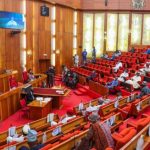National Assembly Demands Realistic Budgets and Economic Diversification Efforts
National Assembly Demands Realistic Budgets and Economic Diversification Efforts
National Assembly Urges Realistic, Focused Budgets for MDAs
The National Assembly has called on Ministries, Departments, and Agencies (MDAs) of the federal government to present realistic, implementable budgets with measurable outcomes, ensuring efficient resource allocation to benefit the public.
During a session on Monday, Senator Sani Musa, Chairman of the Joint National Assembly Committee on Finance, emphasized the need for MDAs to align their budgets with the nation’s development priorities. He stated that budgets should reflect prudence, accountability, and clear purpose to deliver tangible benefits to citizens.
The meeting, attended by the Minister of Finance, Mr. Wale Edun, the Minister of Budget and Economic Planning, Senator Abubakar Bagudu, the Accountant General of the Federation, Dr. Oluwatoyin Madein, and the Chairman of the Fiscal Responsibility Commission, Mr. Victor Muruako, also addressed economic diversification and revenue challenges.
Diversifying the Economy
The National Assembly summoned Edun and Bagudu to discuss efforts to diversify the economy, reducing dependency on crude oil revenues. Edun highlighted the ministry’s commitment to boosting revenue from Customs, the Federal Inland Revenue Service (FIRS), and the oil and non-oil sectors.
He noted the government’s focus on increasing food supply through dry-season farming initiatives, mobilizing 250,000 farmers to produce 750,000 metric tons of assorted grains. Additionally, he stressed the importance of leveraging technology to maximize revenue generation.
Solid Minerals Budget Concerns
Lawmakers raised concerns about inadequate funding for the Ministry of Solid Minerals in the 2025 budget. Minister of Solid Minerals, Mr. Dele Alake, expressed frustrations over the ministry’s allocation, which initially stood at ₦5 billion before being increased to ₦9 billion after extensive lobbying.
Alake detailed his efforts to secure a more substantial budget, emphasizing the ministry’s potential role in economic diversification. Despite positive assurances from budgetary authorities, the allocation remained far below expectations.
Looking Ahead
Senator Musa reiterated the legislature’s role in ensuring efficient and transparent allocation of resources to drive development. He called for collaborative efforts between MDAs and the National Assembly to achieve shared goals of economic progress and public welfare.
Here’s an edited version of the passage for clarity and readability:
—
Although monetary policy aims to reduce inflation, it is equally important for fiscal policy to contribute to this effort. This can be achieved not only by curbing demand but also by increasing supply.
One of the government’s key commitments is to boost food supply. Currently, during the dry season harvest, 250,000 farmers have been mobilized to produce 750,000 metric tons of assorted grains.
Addressing the adoption of an envelope system for budget proposals by Ministries, Departments, and Agencies (MDAs), the minister stated:
“We have adopted a pragmatic approach to improve revenue generation. The envelope system for capital projects is tied to revenue, with a primary focus on ramping up income. For instance, we’ve seen improved revenue collection from the Nigeria Customs Service and the Federal Inland Revenue Service (FIRS).
“The oil sector remains the number one source of revenue and foreign exchange. There is optimism due to improvements in creating a more competitive environment for international investors and oil companies.
“We are also prioritizing the non-oil sector by deploying robust technology to maximize revenue generation.”
Meanwhile, the National Assembly has summoned the Minister of Finance, Mr. Wale Edun, and the Minister of Budget and Economic Planning, Senator Abubakar Atiku Bagudu, to clarify the government’s strategy for diversifying the economy beyond oil dependency.
The Senate and House of Representatives Joint Committees on Solid Minerals, chaired by Senator Ekong Samson and Hon. Gaza Jonathan, expressed concern over the inadequate funding allocated to the Ministry of Solid Minerals in the 2025 budget.
During a hearing, the Minister of Solid Minerals, Mr. Dele Alake, shared his struggles in securing increased budgetary allocations for his ministry. He revealed that the initial allocation was a mere N5 billion.
“In fact, the envelope we first received was N5 billion,” Alake said, addressing the committee members.
He explained that after persistent lobbying and discussions with budgetary authorities, the allocation was eventually increased to N9 billion.
“The Permanent Secretary can confirm this. The night before the President’s budget presentation, the Director of Budget and the Minister of Budget assured us in the presence of the President that the allocation would be significantly increased.
“However, the final figure still stood at N9 billion,” he said, expressing frustration over the lack of sufficient funding.
Alake further explained:
“There is no way to fully describe the numerous engagements we’ve had with the relevant budget authorities. At every stage, we received positive responses, but the outcomes did not match the promises made.”



